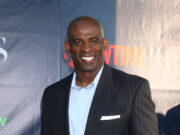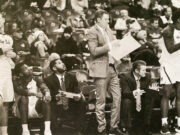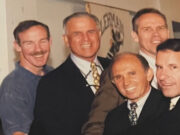by Paul Schienberg, Ph.D.
On March 15, 2003 I had a date with a dream that dated back 45 years.
A press pass to interview baseball players, managers, coaches and trainers for the Baltimore Orioles and Florida Marlins as well as watch a game between the two teams was waiting for me at Fort Lauderdale Stadium. I was going to walk in the footsteps as Mel Allen, Red Barber, Vince Skully, Phil Rizzuto, etc. Listening to those voices was part of what made New York City the best place for a young boy to grow up. So, it wouldn’t get any better than this moment. I had made it to the “Big Show.”

On the morning of the 15th, my adrenaline was pumping, hands were shaking, lips were dry, and knees were knocking. The night before, I had laid out my clothes as I did with my uniform before little league games. There were no attire decisions to be obsessed about the day of the event. I had put my pad, a couple of pens, a micro tape recorder, and my camera into the equipment bag. I was ready to get in my car and go to the ballpark by six o’clock in the morning. My scheduled arrival time was 10:30 A.M.
My hotel room was fifteen minutes from ballpark. I was three and half hours ahead of time. Was I excited? What was I to do with myself? Maybe I should get a decaffeinated coffee and a bagel with a schmeer of cream cheese. That should kill at least an hour. So, I slung the bag strap over my shoulder, put my baseball cap on, opened the door, took the sport section of the paper delivered an hour ago and proudly strutted down the hallway to the front of the lobby and the car that was waiting for me. A couple of Starbuck’s brews while I reviewed the rosters of both teams and formulated a “strategy” got me to Commercial Boulevard about one hour ahead of time. The night lights circled the arena. I drove around the grounds a few times and found the press parking lot, parked, and walked into the press gate where a very nice woman said “hello” and thumbed through some press passes. I leaned over her shoulder ready to be told that she was sorry but there was no pass in my name. And then there it was. My name was written on a yellow card with a string that goes around the neck. I said, “Wow, this is great.” The warm lady looked up surprised. I put the pass on as if I had just won a gold medal. I asked her for instructions and she said to walk onto the field and ask anyone if they would be willing to be interviewed.
Fort Lauderdale Stadium used to be the spring training headquarters for the New York Yankees and has been inhabited by the Baltimore Orioles for a few years now. So, when I walked onto the field I was very aware that this was the same place that the likes of Mickey Mantle, Joe DiMaggio, Whitey Ford, Roger Maris, and Yogi Berra walked on. I understand that this may not seem like a big deal to many, but, to me, it was walking on Mount Sinai. It was very quiet and I took the opportunity to cruise the outfield, take a short jog to first base and sit in the dugout. It’s hard to know how much time I spent doing this for I had entered another state of consciousness.
A couple of Oriole players were throwing a ball back and forth just on the other side of the outfield wall. “Maybe I could borrow someone’s glove.” I walked over. As I entered the practice field, a large man in an orange uniform, number 21 on his back, was teaching a catcher how to pick up a bunt and throw it to second. When he finished instruction, Mike Hargrove, the manager, walked up to where I was standing. on the sidelines.
“Hi Mike. Could I ask you a few questions?”
“No! I’m working. Can’t you see that? Who the heck are you?” He was on the edge of yelling.
“The press.”
“Who told you to be here?”
“The media relations office.”
“I might throw you out of here if you bother me, my coaches or players.
While he was berating me, he unintentional spit in the air. It reminded me of Al Pacino on stage screaming lines in “American Buffalo. Sitting in the first row, I remember the outbursts being, wet and loud and powerful. Mr. Hargrove marched off like a mad dog. I would notice later that he walks on an angle, bent forward at the waist at a 45 degree angle. He entered the media relations office and started a tirade at Bill Stetka – the very accommodating man who authorized my press pass. I could hear Mike yelling through the double pane window. Bill was in some kind of hot water … or at least that is what I thought. People, who yell at others often cause shame, create a desire to hide, not be able to listen and learn, and lose self-esteem. Now I felt all those feelings. I felt them for myself as well as Bill. What would it be like for a young ballplayer that is looking to a manager for respect and guidance? Young people do not have the self-confidence to think that the outburst was due to the manager’s personality and personal struggles. They will take it upon themselves and become self condemning. I am in my 50’s and I needed a while to recover from the exchange. The house of dreams had turned into the house of horrors.
Later in the day, I would see Mike Hargrove speak to another member of his team in a similar fashion. How could a player go out and do a difficult function like hitting a baseball traveling 90 miles an hour after the kind of emotional exchange? Well, I was faced with getting myself centered in an efficient manner and hitting “a homer” for my magazine (getting interviews). I needed an approach. First, I realized that my emotions and physiology had too much control. So I decided to get myself into the “here and now” by doing a fifteen minute meditation and taking a walk. Second, my self esteem had been hurt. I substituted positive self talk for the negative thoughts generated by being yelled at by an authority figure. Third, I wanted to get away from “all or nothing” thinking that had overwhelming me.
Assessing the situation and evaluating what could be salvaged in my “dream” day was critical. One decision was to ignore Mike Hargrove and his Oriole players. Instead, I focused on the Florida Marlins. It was important to calm down and wait for opportunities to come. If I pushed to solve my emotional distress by forcing a successful action, I would most likely increase my problems. These decisions and actions put me back on track to doing my job effectively.
An hour had passed since the exchange with Mike Hargrove. Jeff Torborg, the manager of the Florida Marlins, invited me to come into the dugout and chat. We began by talking about Sandy Koufax. I knew Jeff and Sandy were battery mates during the 60’s and 70’s. Specifically, he had caught Koufax’s perfect game. From there we went on to talk about more contemporary issues related to managing a baseball team during spring training. Jeff Torborg was a warm and engaging man who clearly was interested in helping the press do its job. We talked for almost a half hour and I left the meeting feeling enthused about doing my job. Later, I got to speak to Andy Fox, a short stop for the Marlins. This was a short, ego building, successful action. I went up to the press box and sat in the seats of those announcers of my youth mentioned earlier. I watched the game and went back to my hotel room feeling good about myself and having learned a great deal.
From a much more positive mental state, I thought about Mike Hargrove. What was going on with him? Even though I couldn’t be certain, I wanted to have a more compassionate idea about him even though he had treated me so badly. Parents are people too could be said about managers as well. Certainly, I am not his therapist. But, I wanted to feel what it might be like to be in Mike Hargrove’s shoes.
Mike Hargrove had just lost a young pitcher. Steve Bechler had died in part as a result of taking a diet drug called ephedra. The press had been deluging him and his team with questions – resulting in a major distraction from the accomplishment of his tasks. The death of a player under his responsibility and care must have created anguish and loss for him personally. Ten years ago, as a manager of the Cleveland Indians, there was a terrible car crash which took the lives of two players and seriously injured another. It had happened during spring training – on a day off. He had to face the 50 players on his team and let them know about the tragedy. There is no question that Mike paid a heavy price emotionally. Over the last ten years, he has not allowed any of the teams he has managed to have a day off. He is clearly an emotional man and wants to protect his team and players from frivolous distractions. A team is often considered a family and he is the father. His reaction to me might have been an over protection – but I could now understand it.
Mike is a man who needs to be successful. It is a quality that makes him a great manager. The Baltimore Orioles are not a good team and he knows it. This can be very frustrating. He wants to get the players to be the very best that they can be. Anything that is not related to that goal is a nuisance. Providing interviews to the press does not advance his team’s performance.
Maybe he was letting me know that I broke a rule and he has no tolerance for rule breakers. It could and has lead to destructive consequences. It may be giving him more benefit of the doubt than he deserves – but he did teach me a good lesson – if I’m not sure of the rules – double check them.
My dream of spring training began in the innocence of youth. Who knows what really was going on with my heroes? Were they drunk? Were they having affairs? Were there fights with the manager, coaches, and media? I was drunk with the sights, sounds, and smells of the spring and didn’t see anything else. I have great nostalgia for those days. It was a time of my life! I didn’t want to know that baseball wasn’t just a game. But, the people who participate in it are affected by life’s ups and downs just like the rest of us. As we know, life can be cruel.
So, my spring training dream did not exactly work out as planned. But, my dream was pretty grand and reality doesn’t usually replicate it. Some parts of the dream were fulfilled and others were not. This is all we can expect – to dream, live, learn and adapt. See you next spring.











